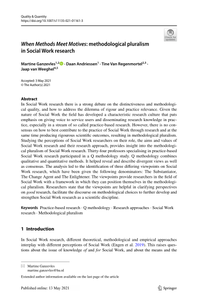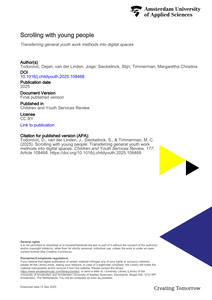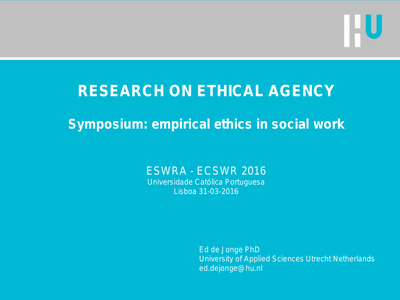In Social Work research there is a strong debate on the distinctiveness and methodological quality, and how to address the dilemma of rigour and practice relevance. Given the nature of Social Work the field has developed a characteristic research culture that puts emphasis on giving voice to service users and disseminating research knowledge in practice, especially in a stream of so called practice-based research. However, there is no consensus on how to best contribute to the practice of Social Work through research and at the same time producing rigourous scientific outcomes, resulting in methodological pluralism. Studying the perceptions of Social Work researchers on their role, the aims and values of Social Work research and their research approach, provides insight into the methodological pluralism of Social Work research. Thirty-four professors specialising in practice-based Social Work research participated in a Q methodology study. Q methodology combines qualitative and quantitative methods. It helped reveal and describe divergent views as well as consensus. The analysis led to the identification of three differing viewpoints on Social Work research, which have been given the following denominators: The Substantiator, The Change Agent and The Enlightener. The viewpoints provide researchers in the field of Social Work with a framework in which they can position themselves in the methodological pluralism. Researchers state that the viewpoints are helpful in clarifying perspectives on good research, facilitate the discourse on methodological choices to further develop and strengthen Social Work research as a scientific discipline
DOCUMENT

With the increasing significance of the online lifeworld in the lives of adolescents, youth work must adapt its methods to support young people’s personal development and social participation in this hybrid online space. To date, there is limited knowledge on how youth workers can effectively employ methodical actions in the online environment. This paper draws on established offline youth work methods to explore their potential transferability to the online context. The research question guiding this study is: How can offline youth work methods be used in the online lifeworld to support adolescents’ developmental needs? Using the Change Laboratory method, 26 youth workers from 14 youth work organisations in the Netherlands participated in this research. The findings suggest that while offline methods provide a valuable resource, they cannot be directly transferred to the online context without adaptation. Instead, they offer a framework for seven specific methodical actions that can be adapted or developed for the online context. They are: 1) Increasing online visibility and accessibility, 2) Orienting, 3) Signalling, 4) Making contact, 5) Building meaningful relationships, 6) Assessing needs, and 7) Providing support. By identifying these seven methodical actions which are crucial for addressing the developmental needs of adolescents online, this paper contributes to the growing body of knowledge on youth work in the online lifeworld.
DOCUMENT

Dit artikel presenteert de resultaten van een discursief psychologische analyse van geruchtvorming op social media. De analyse van Twitterberichten die zijn geplaatst tijdens de zoektocht naar twee vermiste kinderen heeft tot doel inzicht te verwerven in de manier waarop geruchten zich ten tijde van crisissituaties op social media ontwikkelen. In this article we present the results of our analysis of rumour construction on social media from a discursive psychological perspective. The analysis of tweets during a search for two missing kids aims to provide insight into the way rumours develop on social media during a crisis situation, as well as the interactional and rhetorical aspects of rumour construction.
DOCUMENT

Because social workers respond to local contexts, it is often said that social work is not a global profession. Indeed, social workers adapt their practices to local conditions. However, these local practices are recognised globally. The exchange of these practices and methods enriches social workers, inspires them and strengthens the further development of the profession. To facilitate this exchange, social work has had several international associations and networks for almost a century, which have enabled the sharing of local practices and educational programs. Today, social work works within a basic international framework that guides both professional practice and education. This descriptive article will take the reader through the history of international social work, by mentioning some global social work associations and networks and their achievements. Furthermore, the article will address internationalisation of the social work curriculum and will mention the added values and disadvantages of an international experience abroad. (Includes an abstract in the Slovakian language)
MULTIFILE
Symposium ESWRA - ECSWR 2016: empirical ethics in social work. Objective: ethical aspects of social work (esp. at home) Structure: cooperation of the research group of UAS Utrecht Netherlands with six regional welfare organizations Method: practice based ethics research Focus on professional practice: learning from moral experiences in frontline practice (cf. Van Doorn, 2008) Hybrid approach: combining theoretical resources and professional practice (cf. Banks & Gallagher, 2009) Mixed methods: desk research, interviews, best practice units (BPU), development of ethical tools
DOCUMENT

Presentation at the European Conference for Social Work Research, Leuven: Belgium
DOCUMENT

This research aims to contribute to a better understanding of strategic collaborations between work-integration social enterprises (WISEs) and for-profit enterprises (FPEs) with the joint objective to improve labour market opportunities for vulnerable groups. We find that most collaborations strive towards integration or transformation in order to make more social impact.
LINK
This project builds upon a collaboration which has been established since 15 years in the field of social work between teachers and lecturers of Zuyd University, HU University and Elte University. Another network joining this project was CARe Europe, an NGO aimed at improving community care throughout Europe. Before the start of the project already HU University, Tallinn Mental Health Centre and Kwintes were participating in this network. In the course of several international meetings (e.g. CARe Europe conference in Prague in 2005, ENSACT conferences in Dubrovnik in 2009, and Brussels in April 2011, ESN conference in Brussels in March 2011), and many local meetings, it became clear that professionals in the social sector have difficulties to change current practices. There is a great need to develop new methods, which professionals can use to create community care.
DOCUMENT

Wereldwijd onderzoek: Hoe gebruiken nieuwsmedia social media? Jongeren lezen geen krant meer, ze kijken op hun smartphone die ze altijd bij de hand hebben. Binnen het lectoraat social media en reputatiemanagement van NHL hogeschool te Leeuwarden heeft een groep internationale studenten in 12 landen onderzoek gedaan. Hierbij hebben ze meer dan 150 social media sites bestudeerd van nieuws media. De resultaten maken deel uit van een internationaal onderzoek van NHL Hogeschool en Haaga Helia University. De onderzoeksvraag was: Wat speelt zich af in de nieuwsmedia? Persbureaus kunnen het overzicht gebruiken om hun social media te optimaliseren. En voor ieder die journalistiek een warm hart toedraagt is het interessante informatie over de nieuwsmedia in een overgangssituatie (2nd edition)
DOCUMENT

This open access book states that the endemic societal faultlines of our times are deeply intertwined and that they confront us with challenges affecting the security and sustainability of our societies. It states that new ways of inhabiting and cultivating our planet are needed to keep it healthy for future generations. This requires a fundamental shift from the current anthropocentric and economic growth-oriented social contract to a more ecocentric and regenerative natural social contract. The author posits that in a natural social contract, society cannot rely on the market or state alone for solutions to grand societal challenges, nor leave them to individual responsibility. Rather, these problems need to be solved through transformative social-ecological innovation (TSEI), which involves systemic changes that affect sustainability, health and justice. The TSEI framework presented in this book helps to diagnose and advance innovation and change across sectors and disciplines, and at different levels of governance. It identifies intervention points and helps formulate sustainable solutions for policymakers, administrators, concerned citizens and professionals in moving towards a more just and equitable society.
MULTIFILE
